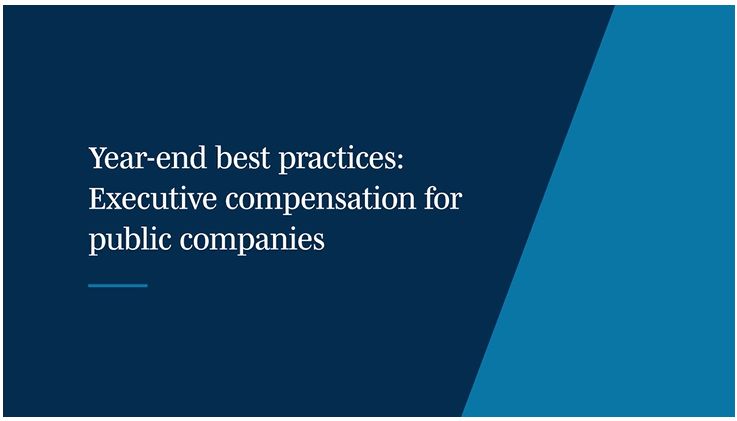- with Senior Company Executives, HR and Finance and Tax Executives
- with readers working within the Banking & Credit, Insurance and Healthcare industries
The 2025 proxy season is fast approaching, and public companies should prepare themselves well in advance. We offer the following checklist of certain year-end compensation considerations which can help public companies position themselves for success in the new year.
Item #1: Equity plan maintenance
Maintaining equity plans requires public companies to think ahead about whether the plan needs any amendments which would be subject to the approval of shareholders and/or the Toronto Stock Exchange (TSX). Draft the relevant amendments and proxy circular disclosure well in advance of finalizing the circular.
Key considerations
- Consider whether shareholder approval is required at the company's next annual general meeting. Do any equity plans require material amendments this year (for example, to increase the share reserve under the plan)—and if so, do TSX rules or the plan terms require shareholder approval? Are any evergreen equity plans due for shareholder approval? Are any new equity plans being adopted?
- Prepare draft amendments well in advance of pre-clearance requirements. Amendments to equity plans that require shareholder approval need to be pre-cleared by the TSX. Plan to provide draft amendments and the draft circular disclosure to the TSX as early as possible, at least a few weeks in advance of finalizing the circular.
- Ensure that any new or amended plan requiring shareholder approval satisfies the most recent guidelines from proxy advisory firms Glass Lewis and ISS, so they do not recommend that shareholders vote against the plan. Among other things, Glass Lewis and ISS give particular consideration to plan cost and dilution when making their voting recommendations.
- Issuers cross-listed on a U.S. stock exchange must also register any shares that may be issued to U.S. residents by filing a registration statement with the U.S. Securities and Exchange Commission. Supplemental listing applications may also be required for any U.S. stock exchange on which the company is listed.
- Companies should ensure that any plan under which U.S. participants are eligible to receive awards complies with or is exempt from applicable U.S. deferred compensation rules and complies with U.S. securities laws.
Item #2: Executive share ownership guidelines
There has been increasing focus among governance groups and proxy advisory firms on executives meeting their share ownership guidelines by holding shares rather than equity awards. Their view is that unvested or unearned awards (such as Performance Share Units and, in certain cases, Restricted Share Units) and stock options should generally not be counted for purposes of determining whether executives have met their ownership guidelines, but traditional Deferred Share Units (DSUs) can be counted.
Key considerations
- Executives should focus on continually building ownership of shares. To encourage this, companies could consider establishing an executive DSU plan or requiring that a portion of any cash-settled equity awards be used by executives to buy shares in the open market until the share ownership targets have been satisfied.
- Be consistent in the valuation method for equity incentives by picking either current value or acquisition price and using it throughout disclosures, irrespective of whether the chosen method results in the highest valuation.
- Consider disclosing the CEO's executive share ownership relative to total direct compensation in addition to the applicable share ownership guideline.
- Consider whether updates should be made to the executive share ownership policy.
Companies can address some of these concerns through disclosure rather than a formal change to policies, for example by disclosing the value of common shares, DSUs and other equity awards held by each executive by separate category rather than on an aggregated basis.
Item #3: Say-on-pay
Many public companies conduct say-on-pay votes at their annual meetings to give shareholders an opportunity to vote on executive compensation. Proxy advisory firms and other governance bodies expect a board response if a company receives approval of its say-on-pay resolution from less than 80% of voting shareholders.
Key considerations
- If a company receives less than 80% approval of its say-on-pay vote, conduct shareholder outreach to understand the reasons for the negative vote. Proxy circulars should also include enhanced disclosure about how the company has engaged with shareholders to address executive compensation, what concerns were raised and what specific actions the company has taken to address these concerns. It is advisable to begin considering what disclosure the company will provide in its next circular to address the prior year's say-on-pay vote.
- Negative say-on-pay recommendations and votes can also impact shareholder votes for the chair and other members of the issuer's compensation committee. If there is concern about pay for performance misalignment, large one-time grants, significant increases or anomalies in named executive officer pay or other problematic pay practices, issuers should begin working on their disclosure to explain the reason for such occurrences and consider whether proactive shareholder engagement would be prudent to avoid surprises at the shareholder meetings.
Final considerations
- Review clawback policies and consider updates to align with best practices.
- Review other company policies, mandates and delegations of authority, and consider appropriate updates.
- Assess potential changes to the named executive officer group and consider any disclosure implications associated with those changes.
- Ensure deadlines for annual elections for DSU and other plans are appropriately managed.
- Review any feedback received from Glass Lewis, ISS, shareholders and other governance bodies over the past year and consider if and how to address concerns with your compensation programs, practices and/or disclosure documents.
- Consider whether any U.S. compensation disclosure requirements or governance best practices should be incorporated into annual disclosures on a voluntary basis.
The content of this article is intended to provide a general guide to the subject matter. Specialist advice should be sought about your specific circumstances.




